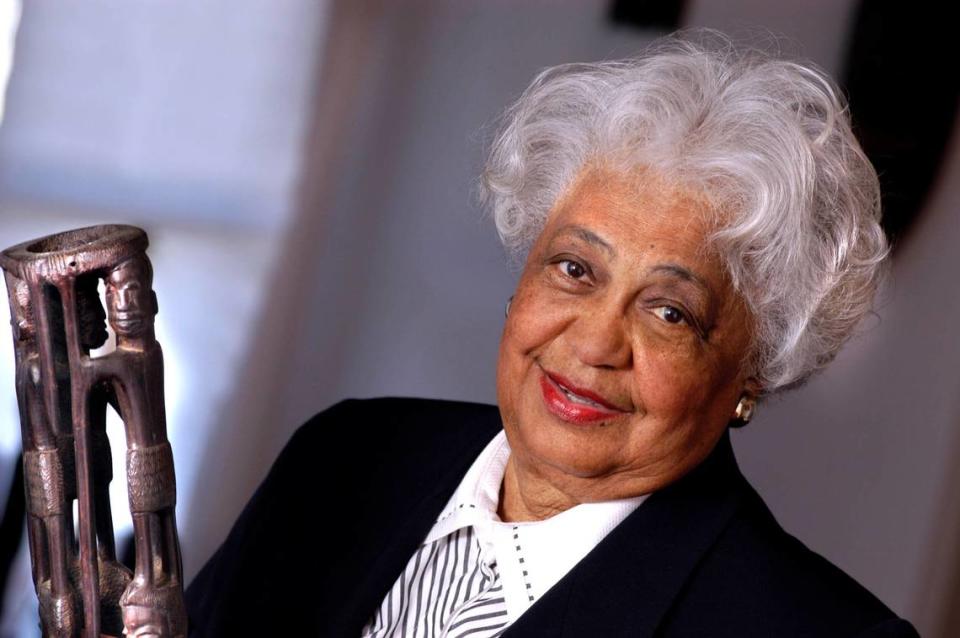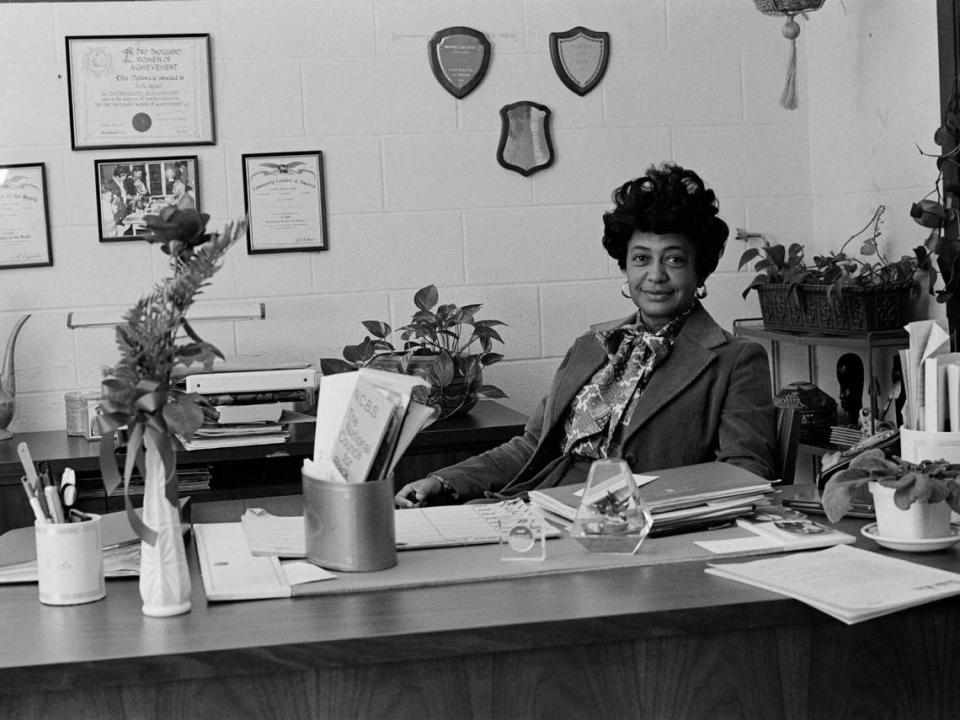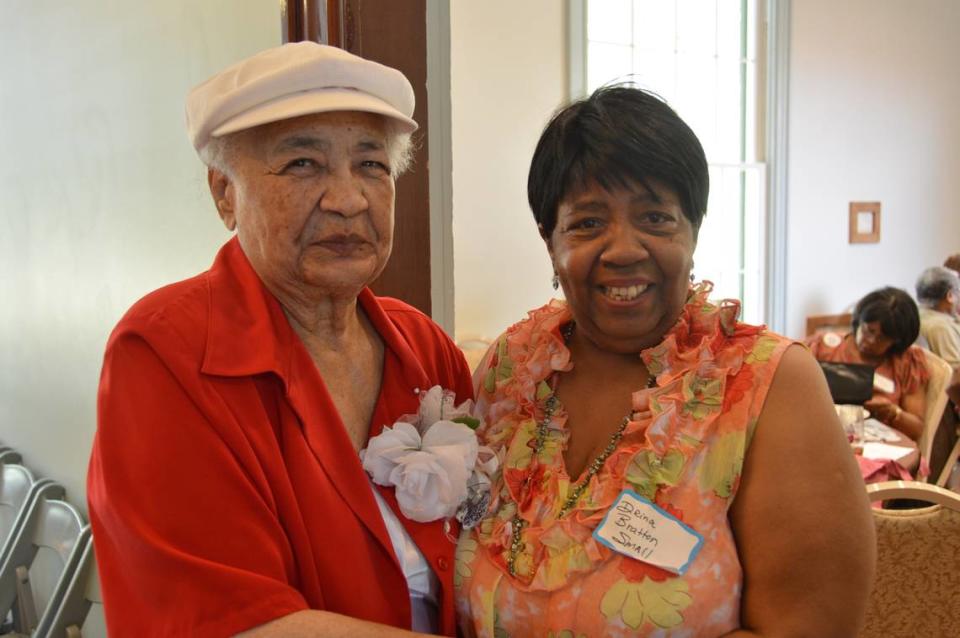‘The power of Black leadership.’ Civil rights icon, teacher, Gantt Center co-founder dies
Fifty years after founding what is now Harvey B. Gantt Center for African American Arts + Culture in Charlotte, civil rights activist and a champion of education, Bertha Maxwell-Roddey died Thursday. She was 93.
The Seneca, S.C., native and Johnson C. Smith University graduate, co-founded the Afro-American Cultural Service Center in Charlotte with the late Mary Harper, now called the Gantt. She also was one of the first Black female principals in Charlotte-Mecklenburg Schools, founded African-American college curriculum programs and taught at UNC Charlotte.
“The Gantt’s existence is thanks to Roddey’s tenacity and willingness to support others,” museum CEO and president Bonita Buford told The Charlotte Observer. It was Harper who had the idea to create a cultural center to preserve Black history in the city, Buford said, and Maxwell-Roddey “embraced that.”
Buford, who took over the reins at the center this year, is grateful for both women: “our founding mothers.”
“They left something tangible that’s going to make life better for people in our community,” Buford said. “I feel gratitude that (Maxwell-Roddey) was in the world and this institution is a result of her leaving a mark and legacy that serves us in the present (and) for years to come.”
It is with great sadness that we announce the passing of Dr. Bertha Maxwell-Roddey. Her legacy will live on through the countless lives she has influenced through education, community advocacy, and the importance of preserving and celebrating Black history, arts, and culture. pic.twitter.com/UCqzOVdDs5
— Harvey B. Gantt Center (@HBGanttCenter) March 21, 2024
Former Charlotte mayor Harvey Gantt, for whom the museum is named, struck up a friendship with Maxwell-Roddey long before either had made their mark in Charlotte.
“I remember many times when her drive and her push for something she cared about overcame the room. She was a powerful lady,” said Gantt, elected to Charlotte city council in 1974 and who was the city’s first Black mayor in 1983. “When Bertha entered the room people paid attention.”

Gantt said the last time he saw Maxwell-Roddey was about six Sundays ago at Friendship Missionary Baptist Church, where she always sat in the second row of pews.
“She was always well dressed, hair perfectly in place and she loved that sorority (Gamma Lambda Chapter of Delta Sigma Theta Sorority) so she loved to wear red,” Gantt said. “This community is going to miss such an iconic figure who had a lot to do with Black culture and education in our community.”

A trailblazer in education and Black studies
Maxwell-Roddey’s list of firsts is a long one.
In 1968, she became one of Charlotte’s first Black female principals at a formerly all-white CMS elementary school. “That was unheard of at the time,” said Willie Griffin, assistant professor of history UNC Charlotte.
She was the first Black woman to graduate with a master’s from UNC Greensboro.
She was the founder of the Head Start program in Charlotte.
Dr. Bertha Maxwell-Roddey’s groundbreaking career as an educator—as a principal helping to desegregating @CharMeckSchools administration, as the first director of @africana_uncc, and as the co-founder of the @HBGanttCenter—has had a lasting impact inside & outside the classroom. pic.twitter.com/f5l1OOMGe4
— UNC Charlotte Special Collections (@CLTSpecColl) February 8, 2023
Maxwell-Roddey also was founder and the first chair of the Department of Africana studies at UNC Charlotte, and founder of the National Council for Black Studies in 1975.
“She was the godmother of the Black studies movement in this country, not just in Charlotte,” Griffin said.
And last year, the UNC Charlotte J. Murrey Atkins Library ran a month-long exhibit honoring Maxwell-Roddey.
Lessons from history
Starting in the late 1990s, Maxwell-Roddey worked with Historic Brattonsville to help break the stigma of telling the history of slavery at the former York County, S.C., plantation, and working with descendants.
“She was instrumental in making the African-American story be heard and encouraging this history to be told,” said Marie Cheek, spokeswoman for Culture & Heritage Museums. “I don’t think you can tell the story of Brattonsville without telling the story of the African-Americans that were enslaved there. They’re the ones who built the place and ran the plantation.”
That’s when the Rev. Strauss Moore Shiple met Maxwell-Roddey, who was recruiting historic interpreters. When Bratton descendant Shiple walked into the room, Maxwell-Roddey told her she looked like the Egyptian pharaoh Hatshepsut.
“When she said that to me, I could not turn her down or anything else she wanted me to do,” Shiple said.
Shiple considered Maxwell-Roddey, who was educated and spiritual, a “mentor and encourager” when she didn’t have a lot of other Black role models. In 2008, Shiple was awarded the museum’s Keeper of the Culture award after being nominated by Maxwell-Roddey for work at Brattonsville and other work in the county.
“She was very proud of her heritage and wanted to share it with us and to instill that in younger people,” Shiple said. “I will always love her for what she saw in me that I did not see in myself.”

Changing lives
Sonya Ramsey, who wrote the 2022 biography “Bertha Maxwell-Roddey, A Modern-Day Race Woman and The Power of Black Leadership,” said she learned something new about her every time they met.
“The activism never ended. It just traveled from out on the streets into the boardrooms, into those offices, into the classrooms,” said Ramsey, a UNC Charlotte history professor and director of the Women’s and Gender Studies Program.
“She really redefined the idea of a traditional activist marching in the street,” Ramsey said.
Maxwell-Roddey was often the first Black woman in many spaces. “She wants her work to keep that door open for other people. And to do that you have to build institutions and organizations to sustain them.”
After retiring from UNC Charlotte in 1986, Maxwell-Roddey taught for another 20 years at USC Lancaster. She served on over 50 nonprofit boards. And she was the 20th national president of Delta Sigma Theta sorority, a Black women’s public service organization.
The South Atlantic Region would like to wish our 20th National President Dr. Bertha Maxwell Roddey a SENSATIONAL Happy Birthday. You are a trailblazer and your powerful impact to our region and to our sorority have been undeniable. We love you and pray God continues to bless you! pic.twitter.com/WguNVrLuEh
— South Atlantic Region-DST (@SensationalSAR) June 10, 2023
Maxwell-Roddey received a number of accolades over the years, too, including the N.C. Order of the Long Leaf Pine prestigious service award and the Thurgood Marshal Award of Education.
Maxwell-Roddey inspired her students, who still visited her to share how she impacted her lives, Ramsey said. “To know someone who did that, what an extraordinary experience.”
Maxwell-Roddey was preceded in death by her husband Theodore “Thed” Roddey Jr. She is survived by daughter Tawanna Proctor, and several grandchildren and great-children. Funeral arrangements have not been set.



